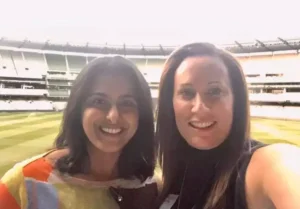The Women’s Coaching Association is smashing the grass ceiling

Julia Hay and Aish Ravi founded the Women’s Coaching Association. Image: Wayne Taylor/supplied.
Passed over for roles. Ignored. Patronised. Verbally abused. Sexually harassed. For women coaching sport—any sport—these are not unusual experiences. In fact, according to Aish Ravi and Julia Hay, founders of the Women’s Coaching Association, they’re incredibly common.
“You kind of have to put up with that like, casual harassment in all these settings,” Aish said. “And that’s part of the problem that Jules and I, through the [Women’s] Coaching Association want to highlight. The professionalism of all these environments. What’s okay and what’s not, because it seems to be a really blurred line, where casual harassment is just accepted. And you have to be part of that banter to just kind of pass in all of these environments, when you shouldn’t have to.”
Launched in 2020, the Women’s Coaching Association (WCA) was established, Julia explains, as “a network for women who coach or who would like to coach and a place, a safe place to come together, to unpack some of the challenges, but also the opportunities that exist in that space.”
Together, Julia and Aish have more than twenty years’ experience in coaching. But throughout their time on the sidelines—which continues today with Julia an assistant coach for Williamstown VFLW team and Aish one of only a handful of B Level certified round-ball football coaches in the country—they say there’s never been an organisation or association that has specifically supported female coaches across all sports.
“There’s a lot of other coaching associations, but they’re often also siloed to some sports,” Aish said. “So, in football, we have Football Coaches Australia, which represents football coaches, but only football coaches.
“We found that there was really nothing to support us, like as coaches, we wanted support. And we would have liked to find… an association, perhaps that was representing women coaches, but there really wasn’t anything.”
So, they created that association.



